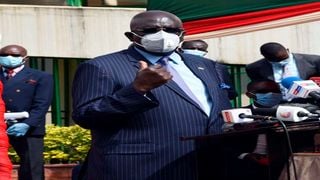
Education Cabinet Secretary George Magoha speaks during the release of the 2020 Kenya Certificate of Secondary Education exam results at Mitihani House in Nairobi on May 10.
| Evans Habil | Nation Media GroupEducation
Premium
Delayed Form One selection creates room for canvassing
The decision to delay Form One selection for six weeks after the release of Standard Eight exam results has opened a window to aggressive canvassing for vacancies, especially in top-performing secondary schools.
The results were released on April 15 but candidates and their families have to anxiously wait until May 28, when the selection will begin, to know their fate.
Traditionally, the selection begins almost immediately after the release of the results but was delayed this year because, in the reorganised school calendar, the learners will not join Form One until the last week of July.
“The ministry should have done the selection early and issued us with admission letters so that we may know the requirements by the schools and prepare our children,” Mr Fred Opiyo, a parent in Nairobi, told Nation yesterday.
The anxiety has increased following the release of Form Four exam results last week, with parents eager to secure places for their children in schools that either performed well or have a history of good performance.
Admission letters
“It’s normal for parents to do so (canvass) but our stand is; wait first until the selection is done. From the experience of the last two years, we cannot commit to or promise anything,” Lenana School principal William Kemei told Nation yesterday.
“There’s little that can be done since everything will be online on the National Education Management Information System (NEMIS).”
Another principal from a top sub-county school in Embu County said a number of learners had applied to join the institution but they could not issue them with admission letters before placement by the ministry.
In recent years, many parents and learners were left disappointed after failing to get admission to the schools of their choice, and this could also be fuelling the ongoing lobbying.
Additionally, some national schools such as Starehe Boys Centre, Starehe Girls Centre, Moi Forces Lanet, Utumishi Academy, Utumishi Girls and Moi Tea Girls usually pre-select their students before the national exercise.
In 2019, the ministry opened a window for learners who wished to transfer to their preferred schools to do so.
But this year, the ongoing canvassing for places will only bear fruit in case selected candidates fail to report, thereby creating vacancies.
Form One slots
The soliciting of Form One slots has been going on despite assurances by Education Cabinet Secretary George Magoha that the exercise will be “water-tight, credible and of high integrity.”
He made the assurance when he released the results last month, adding that all the candidates will get admission to secondary schools in line with the government’s 100 percent transition policy.
“I wish to assure the country that the ministry has already conducted an audit of all new and existing vacancies in all our private and public schools to enable us to admit all learners under the Free Day Secondary Education Programme,” Prof Magoha said at the time.
The Education ministry uses a computerised system to place learners in secondary schools based on their choices and performance.
Candidates are allowed to select four national schools. The ministry places the top candidates from each county in national schools.
In addition, the learners then select three extra-county schools and two county and sub-county schools each.
The capacity of the schools is a factor in addition to the overall performance in the counties the learners come from.
Schools for learners with special needs are categorised as national schools and admit them according to the nature of their disability.
The learners are expected to report to school in the last week of July when the first term of the 2021 academic year will begin. The term will be covered in only 10 weeks.
There was uproar after the release of the Kenya Certificate of Primary Education exam results, with private schools accusing the Kenya National Examinations Council of marking down their candidates.





